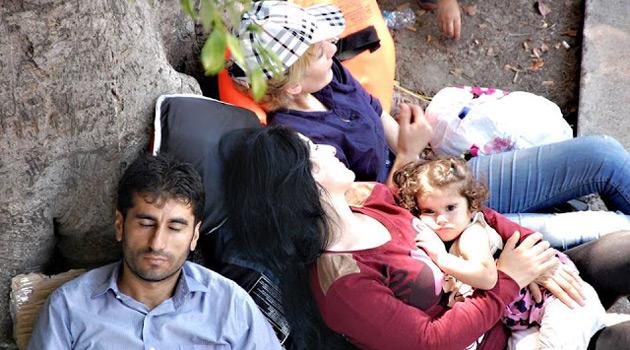Turkey: Dom refugees from Syria find refuge in the Tarlabaşi neighborhood of Istanbul

The British newspaper The Guardian has reported that children from a community known in Syria as the Dom can be seen these days selling bottled water to drivers passing through the northwestern part of Istanbul in the area around Taksim Square. Due to the crisis in the Middle East, an estimated 26 000 members of that community are now homeless.
Members of the Dom community in Syria were frequently ostracized during peacetime and face racial discrimination there to this day. Prior to the outbreak of the war in Syria, around 300 000 of them lived there, according to The Guardian.
Now most of them are living on the streets of Istanbul’s ghettos. A nonprofit organization, Tarlabaşı Toplum Merkezi (TTM), which has been working in Istanbul for 10 years, is doing its best to aid them.
Ceren Suntekin, a social worker with the community center in which four employees and several volunteers are doing their best to provide aid for almost 5 000 children and 3 000 adults, told The Guardian the refugees are “living in horrible conditions”. The volunteers include lawyers, musicians, and teachers who provide support with educating the children and with legal and psychological aid for everybody.
One of their volunteers is Hasan Kizillar (age 19), who comes from a poor Romani family in Turkey himself. The NGO, however, has supported his talent so he could learn to play the piano, violin, and other musical instruments, and now he teaches music at the center.
Suntekin told The Guardian that “Most of [the Dom refugees] beg, collect garbage in the streets, or sell things, such as flowers, near tourist destinations. However, they do not fit the image of Istanbul that the police are doing their best to create. They do all they can to escape this way of life, but frequently they experience discrimination from teachers and don’t have an environment in which they can prepare themselves for going to school.”
Ebry Ergun, a psychologist who has worked at the center for the last five years, told The Guardian that “Violence, problems with drugs and prostitution are more visible here than anywhere else in the city.” Many children in the neighborhood do not manage to complete primary school and end up on the streets as beggars who are dependent on state social services.
“We are convincing families who have daughters to support their education so they can enjoy equality,” Ergun told The Guardian. In the Tarlabaşı quarter, according to him, there are many cases of domestic violence, and recently a case came to light of a mother and two daughters in one migrant family who were constantly beaten for several years.
“They used to come here regularly,” Ergun told The Guardian. “We succeeded in finding them a good lawyer, and by now the husband has been arrested and the children are safe. We also aided the mother with finding work. We hope they now have a better life.”
Demolition ahead
This particular organization, however, may not exist much longer, according to The Guardian. The Tarlabaşı neighborhood will soon undergo a significant change.
Turkish President Recep Tayyip Erdogan has declared that he wants to transform Istanbul and is allocating the equivalent of USD 100 billion to rebuild its infrastructure. Tarlabaşı will be part of that urban renewal plan.
Billboards all over the city announce the future vision for the quarter by depicting elegant young couples strolling past modern apartment buildings, hotels and retailers. Issam Saade, a 51-year-old Kurdish waiter who has lived in the neighborhood since the mid-1990s, told The Guardian he is doing all he can to make sure he will not be evicted by court order.
Two years ago, Istanbul very rapidly raised rents and the NGO center was faced with th eprospect of closure. The Guardian reports that fortunately, donations came from Great Britain, the Netherlands, Sweden and the USA so the center was able to continue its work.
“The process of gentrification attracts many tourists. The state wants to get rid of the immigrants and refugees who now live in Tarlabaşı,” Ergun told The Guardian.
Many have nowhere else to go, but the Turkish state is reportedly not interested in that fact. “They will have to move where they can afford to live, and when they go, we will go with them. Our center is one of just a few places where it is safe for children from those communities and where the women can discuss their problems. The most impoverished of all who beg in the streets near Taksim Square – where will they go? We actually do not know and I believe they don’t either,” Ergun told The Guardian.
Roma from Syria also fleeing to Spain
The chair of the Spanish Romani Union, former MEP Juan de Dios Ramírez-Heredia, pointed out last autumn that “thousands of Romani people are living in extreme poverty in Iraq. However, what is even more important is that they are persecuted by fundamentalist militias. They want to flee that country, but because of their poverty they are unable to get together the money demanded by the trafficking mafia to do so.”
Syrian Romani people arrived last year at a refugee center in the city of Mellila, Spain’s territory on the North African coast, Heredia said. The Spanish Romani Union offered its legal services to the Spanish Government last year with regard to dealing with the refugee influx.
